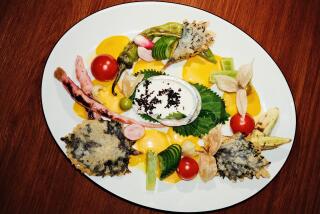Star-Kist May Rescue Fishermen by Opening Small Tuna Operation
TERMINAL ISLAND — Star-Kist Foods Inc., in a move some local fishermen say could keep them afloat, is studying the possibility of opening a small-scale tuna processing operation at its mackerel cannery.
Ed Ryan, Star-Kist’s administrative vice president, said that while the company has not reached a final decision, it is “almost certain” it will start the operation in March or April.
Possible Break
Ryan said the company, which closed its tuna cannery and laid off more than 1,100 workers last fall, would probably process between 5,000 and 10,000 tons of tuna a year in the new operation. The tuna cannery that was shut down was capable of processing about 100,000 tons of tuna a year, he said.
While no new jobs are likely to be created, Ryan said, the tuna operation would mean that the existing crew of about 85 mackerel cannery workers would probably have full-time work.
Ryan said the tuna operation, which would be built by transferring machinery from the closed plant to the nearby mackerel facility, would be used to process albacore tuna caught by California fishermen during the summer. He estimated that there are more than 300 such fishermen, most of whom operate small boats and catch a variety of fish.
What is more important for the small San Pedro fishing fleet, however, is that the operation would probably process fish caught by the three or four local tuna boat owners who were left with no place to sell fish when the company closed its tuna cannery, Ryan said.
Furthermore, Larry Bozanich, general manager of the 30-member Fisherman’s Cooperative Assn. in San Pedro, said that if Star-Kist does open a tuna processing operation, local mackerel fishermen could benefit greatly.
Bozanich said that such fishermen have typically relied on selling tuna to Star-Kist to supplement their incomes. During an average season, he said, mackerel fishermen usually earn about 20% of their income by catching tuna. That represents the break-even point for many fishermen, he said.
Fact of Survival
Last year, when tuna fishing in local waters was especially good, many fishermen made 50% of their income by selling tuna to the company, he said.
Bozanich, as well as several local skippers, said that even if Star-Kist starts processing small amounts of tuna, it is still not certain whether the company would pay enough for the fish to make it profitable for tuna boat owners to resume operations. The company has not decided how much it would pay for the fish.
And if Star-Kist does not open the processing operation, the tuna skippers will be left with no alternatives other than to stop fishing or go elsewhere because the only remaining local tuna cannery, Pan Pacific Fisheries, is buying fish from only a handful of boats with which it has contracts.
“We have been badgering (Star-Kist) to open the operation,” Bozanich said. “It is a mere fact of survival that unless we get some kind of processing operation in here, some fishermen might as well go bankrupt.”
Ron Misetich, owner of the tuna boat Anthony M, said he laid off his 13-member crew in September because he had no place to sell tuna. He said Star-Kist’s plan to open the tuna operation is his “only salvation” because his boat is too small to take to another country to fish.
“I don’t think it will be the greatest,” Misetich said. “But maybe I can make a living for right now and stay at even keel.”
Anton Stanojevich, another tuna boat skipper, said he is concerned whether Star-Kist would buy enough tuna at a price high enough to allow him to keep fishing. He said that he last fished for tuna in December, and still has 200 tons of tuna aboard his vessel that he has not been able to sell.
Stanojevich said he is negotiating with Pan Pacific to buy the fish and to give him a contract for future catches.
Future Not Sure
“It’s hard to tell,” Stanojevich said. “If Star-Kist doesn’t open the line and I’m not successful (in signing a contract with Pan Pacific), I really don’t know what I’ll do. The only (other) chance I have is to fish in Panama and try to ship (the tuna) to Puerto Rico.”
In a related development, the Fisherman’s Cooperative will ask the state Fish and Game Commission to increase the amount of mackerel fishermen can catch during the 1984-85 quota year.
Bozanich said mackerel fishermen have been idle since December, when they reached the state-imposed 26,000-ton quota. The quota was initially set at 16,000 tons, but Fish and Game officials increased the amount twice after determining that there were more mackerel in local waters than first believed. The quota year begins July 1.
The commission will meet Friday at 8 a.m. in the Long Beach City Council chambers.
More to Read
Inside the business of entertainment
The Wide Shot brings you news, analysis and insights on everything from streaming wars to production — and what it all means for the future.
You may occasionally receive promotional content from the Los Angeles Times.










